This post contains affiliate links.
Throughout my years as a baker, I’ve learned the struggles of getting your cake’s texture to be just right. Thankfully, I had a mentor by my side who thought me how to avoid baking a crumbly cake. Learning how to prevent a crumbly cake has saved me so much time and hassle throughout these years. Hopefully, these tips will help you avoid a crumbly cake as well!
A cake is crumbly because of using too much flour, overmixing cake batter, not adding enough shortening, or not adding enough sugar. Flour contains gluten which, in excessive or small amounts, can change the structural integrity of the cake by making it crumbly and moist.
Seeing that some bakers are still struggling with crumbly cakes, I’ve committed to getting an in-depth dive into understanding why a cake becomes crumbly and moist.
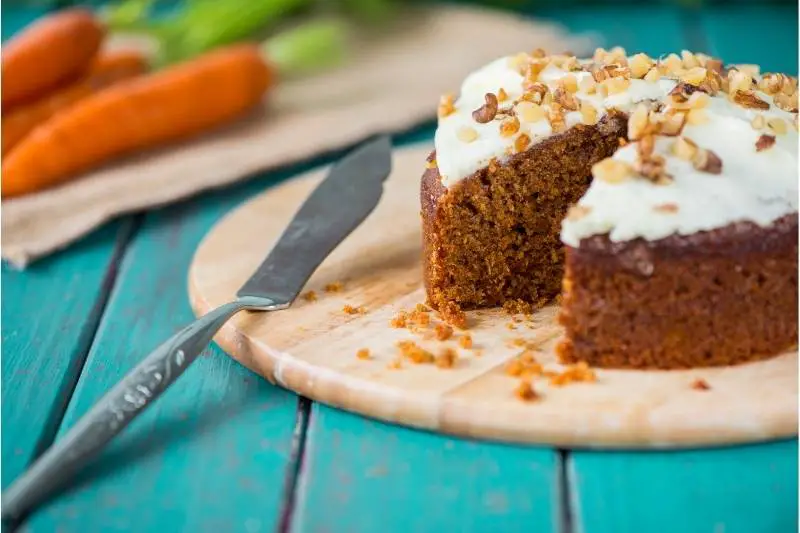
This deep dive into the mysteries of baking has uncovered many different loopholes to fix or prevent a crumbly and moist cake, that I’ve used to this day. Many unique solutions exist for this problem and learning all these simple solutions has made me a better baker today.
Why Is Your Cake Crumbly
A cake is crumbly and moist because of the high or low gluten content of the flour that is used to bake it. Flour is an ingredient that contains gluten. When flour is used in excessive amounts to bake a cake, excessive amounts of gluten are therefore added to the cake batter.
This could be bad for your cake because too much gluten can affect the texture of the cake when it’s done.
Gluten’s role in baking is to give structure to your baked goods. This could include texture, shape, and even form. Since gluten is a protein that is sticky and stretchy, it is used to bake almost anything.
*By the way, I recently wrote an article about How to Aerate & Measure Flour The Right Way. This article talks about all the things you need to know to make sure you properly use flour when baking. You can check out this article here!
When baking anything in the oven, you have to use the correct measurements in order to get the results that you want. This is imperative because too much of one ingredient can mean not enough of the other ingredients.
Not adding enough shortening to your cake batter could turn out to be a nightmare for your cake. Shortening and other types of high-fat ingredients help stick the cake together. Adding enough shortening, or as specified in your recipe, is crucial in order for your cake to not end up dry and crumbly.
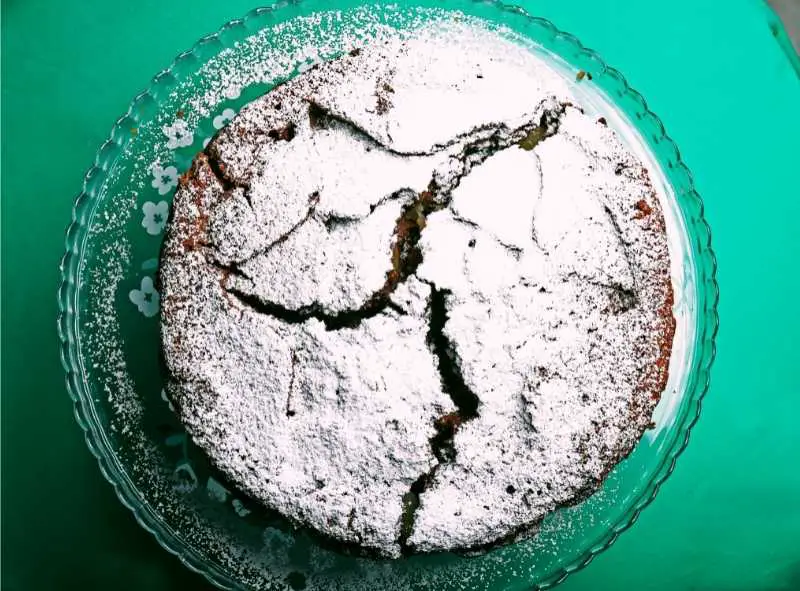
The best tool that I’ve found to sift my flour is a Battery Operated Electric Flour Sifter For Baking. This wonderful tool automates all of my sifting needs in the kitchen! It has a 4-cup capacity and is washable. What else do you need in an automatic sifter? You can check out this Electric Flour Sifter on Amazon!
Not adding enough shortening can also indicate that you might be overfilling your cake with flour. As mentioned before, high amounts of gluten in the cake will make the cake dry and crumbly while falling apart.
The same goes for not adding enough sugar. When I bake my cakes, I try to stick to the recipe as close as possible. Not adding enough sugar can prompt you to accidentally add too much flour to make your batter thicker.
Adding too much flour is a crucial mistake that every baker should avoid! Whether it be regular flour, gluten-free flour, or any other flour, adding too much of it will dry up your cake.
I avoid all of these issues by simply using a Digital Scale which is a lifesaver in my kitchen. I recommend using a Nicewell Digital Food Scale which runs on batteries making it a wireless, hassle-free option. You can find it on Amazon!
Why Is Your Cake Moist
As a whole, a cake is too moist because of not using enough gluten in the cake batter. Gluten-free flour can change the structural integrity of the cake by making it crumbly and moist. Alternatively, a cake can also be moist if it was underbaked.
Just as there could be too much gluten in a cake, there could also be not enough. If you’re making a gluten-free cake, using gluten-free flour to bake the cake can also take away from the structural integrity of your cake. Lack of gluten in a cake means that it will be unable to form a firm texture, which will ultimately make your cake too moist.
Another reason why a cake could be moist is that you took it out of the oven a bit too early. As a baker who’s taken her cake out of the oven early many times, I can tell you that it’s not the end of the world!
Put your cake back into the oven as soon as possible and crank the oven to the same temperature as before. This will help the cake continue its baking process without losing too much heat. Continue checking your cake much more often to avoid overbaking it.
If your cake is not too moist, I would suggest checking on the cake every few minutes in order to avoid overbaking it.
However, if your cake is way too moist and you took it out way too early, I would suggest checking up on it every 5-7 minutes so that you don’t open your oven too much. Opening your oven too often will deflate your cake and give you a bigger headache to deal with.
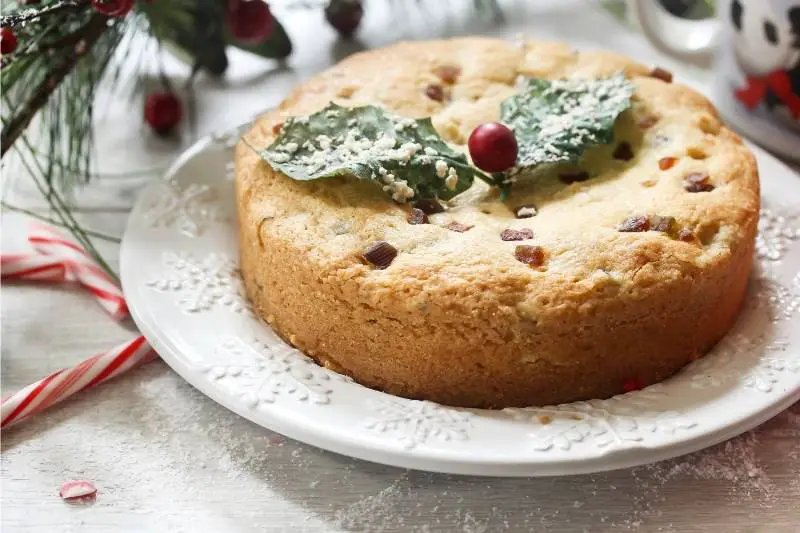
As mentioned before, precise measurements are important when it comes to baking. That being said, some people love to use their cupcake recipes and ingredients to bake their normal-sized cakes.
This is one big reason why the measurement of ingredients could end up being wrong when making the batter. In addition to adding a little more ingredient for a bigger-sized cake, I would suggest increasing the cake’s baking time.
To prevent a moist cake, make sure to add enough flour to your cake batter. This will help thicken your mixture and give it the right texture.
*Side Note: I recently wrote an article about If Homemade Cakes are Healthier than Store-Bought Cakes. This article talks about if homemade cakes are actually better while breaking it down in detail. You can check out this article here!
Why do your cakes fall apart?
As a general rule, cakes usually fall apart when cutting because they are overbaked. Overbaking a cake will result in the cake being too firm. Turning an overbaked cake out of the pan too quickly can result in the cake falling apart since the inside of the cake did not settle yet.
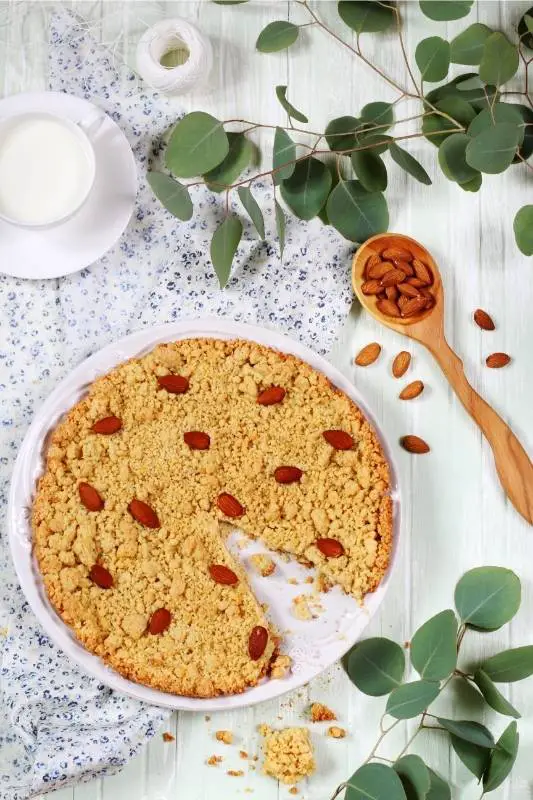
This cake is too dry and crumbly for my liking!
*By the way, if you are interested in knowing how to get Stuck Parchment Off of Your Cake and how to Prevent It, I recently wrote an article about Removing Stuck Parchment Paper, which you can find here!
While all of these mistakes are common, the most common mistake that I see bakers make is overmixing their batter. To understand why that is a mistake, we first have to look into why we mix cake batter in the first place.
Cake batter is mixed together in order to combine the wet and dry ingredients while incorporating air into the mixture. Air mixed into the batter will give the cake a nice light and airy texture.
Overmixing your cake batter will do the exact opposite to your cake by incorporating too much air into the mixture. This will make your cake crumble and fall apart when you’re cutting it.
How to prevent a cake from crumbling?
As a whole, prevent a cake from crumbling by following the cake’s recipe precisely. Baking a cake requires the use of precise measurements and ratios of all ingredients. Make sure to leave your cake in the oven for the exact time specified in your recipe.
When it comes to baking, you absolutely have to follow the proper measurements in your recipes like your life depends on it!
Not only do you have to make sure that your ingredient measurements are on point, but you also have to make sure that the ratio that you use to add them in is correct.
For example, if we’re building a recipe with 1 cup sugar, we’ll need about 1-1/2 cups flour. Using the right ratios will help prevent too much flour or not enough sugar. This, in turn, will help prevent a crumbly cake.
Baking time is also just as important as the ingredients. If you leave your cake inside the oven for just 5 minutes more than the recipe requires, it might leave you with an overbaked dry and crumbly cake.
Opening your oven too often is another reason your cake might turn out crumbly. When you often open your oven, the heat built within it escapes at a rapid rate. You might not notice it right away but taking your cake out of the oven at its designated time after the oven had been open will leave your cake raw!
This will require you to put the cake back into the oven to finish up the baking process. Usually, that’s not something to be afraid of too much. However, the cake could come out dry and crumbly the second time you end up putting it in.
How do you fix a crumbly cake?
As a general rule, adding more high-fat content such as butter and oils can fix a crumbly cake. Ingredients that are higher in fats can stick the crumbly contents of the cake together. This will help hold the cake together and avoid crumbling while cutting it.
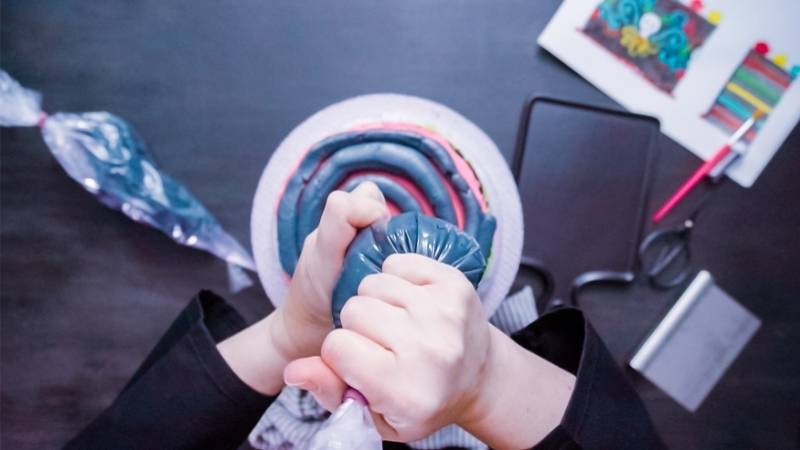
If you want to use a healthier alternative to high-fat ingredients, I would recommend for you to add applesauce, yogurt, bananas, or even dates into your mixture.
When puréed, these alternatives will add moisture to your cake which will prevent it from drying. These alternatives will also maintain low calories in the cake for those who chose it.
When I first came across this problem, I had to think quickly on my feet since I was going to serve this cake to my guests soon. I thought about it, and I realized that adding some kind of moisture to my cake can help it stick better while not falling apart.
At that time, I didn’t know about adding some kind of high-fat content to the mixture, so what I did was put icing and a whole bunch of cake decorations on top of the cake to hide its imperfections.
*Side Note: If you ever wanted to know The Real Difference Between A Sponge Cake and A Butter Cake. I wrote an article about it that you can find here!
Why is your cake dry and crumbly?
As a whole, a cake is dry and crumbly because of overbaking it or using too much flour. Overbaking a cake will evaporate all the moisture out of it while flour contains gluten which, in excessive amounts, can change the structural integrity of the cake by making it dry and crumbly.
Adding flour is the trickiest part of baking a cake. I always make sure to add the correct ratio of flour, based on the remaining ingredients in the recipe.
Too much flour = Dry and crumbly cake
Overbaking a cake is a common mistake that bakers come across while baking. It is not uncommon even amongst the most professional of bakers.
It is not that hard to accidentally overbake your cake. You can follow your recipe correctly all the way through, but if you turned up your oven a few degrees higher than the recipe suggests, you will end up with an overbaked dry cake.
It’s also a possibility that you accidentally left your cake in the oven for a few minutes longer while you’re tending to other duties. This will evaporate the moisture from your cake and leave you trying to fix a dry and crumbly cake!
*Side Note: I recently wrote an article about The Best Ways To Fix & Prevent a Dense Cake. This article talks about how to fix a failed dense cake and prevent it from occurring. You can check out this article here!


